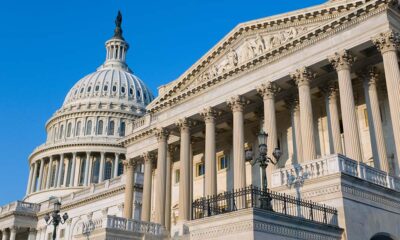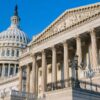
Politics
The Push for ‘Day One Equity’ in New York’s Legalization Effort
With rival cannabis legalization bills now pending in New York, state activists are demanding “Day One Equity” — legislation consciously crafted to correct the injustices of the War on Drugs.
New York state appears to be on a final countdown to cannabis legalization in some form. But with competing versions of the legalization bill contending in the statehouse in Albany, advocates who mounted the drive for legal cannabis around issues of social and racial justice have been holding meetings across the state to push for a law that addresses their concerns.
The most recent, a “Forum on the Legalization of Marijuana” held on Manhattan’s Lower East Side on March 3, brought these concerns into sharp focus — and displayed growing support for the agenda of “Day One Equity.”
Politicians Join With Activists
Most notable about the forum was the mix of powerful politicians and grassroots activists who took the podium in an auditorium of the Lillian Wald public housing project on the Lower East Side. The proceedings were opened by Harvey Epstein, the local assembly member who is a co-sponsor of the Marijuana Regulation and Taxation Act, or MRTA. He set the tone by saying that any legalization effort must “deal with profound injustice of the war on drugs and how it’s impacted people of color. We don’t want legislative process benefiting private equity firms and wealthy white folks.”
“How do we create opportunities for communities that have been impacted by the drug war?” Epstein asked rhetorically. “We need to create legislation that does not continue the harm to communities of color.”
Next up was Congressmember Carolyn Maloney, decked out in a New York Fire Department bunker coat emblazoned with her name on the back to promote her 9-11 Health and Compensation Bill. She also struck a forthright tone: “We need the War on Drugs to come to an end, and we have to start by decriminalizing and taxing and expunging convictions.” She also noted that “fed enforcement has become more severe under Trump.”
Maloney said that she is “a proud member of the Congressional Cannabis Caucus,” and boasted her support for the Marijuana Justice Act “to legalize at the federal level, and take the tax revenue and invest it in the very communities that have been targeted and persecuted by the discriminatory war on drugs.”
Manhattan Borough President Gale Brewer also took the stage to declare her support for MRTA.
Why Decriminalization Isn’t Enough
It was the final speaker who really broke down the issues: Kassandra Frederique, director of the New York state chapter of Drug Policy Action, the advocacy and political arm of the Drug Policy Alliance. She portrayed a long arc of history that has finally brought the Empire State within sight of cannabis justice.
“New York state pioneered mandatory minimum sentences nationwide with the Rockefeller laws, which included cannabis,” Frederique sad, referring to the harsh drug laws enacted by Gov. Nelson Rockefeller in 1973. “Decriminalization of cannabis in New York state four years later came about because the law was impacting white kids, if not nearly in the same numbers as black and Latino kids. Mothers of white kids started complaining to district attorneys who in turn complained to the state Assembly. Yet from the early ’90s to now, there have been 800,000 arrests for cannabis in New York state.”
This, Frederique asserted, was due to New York City’s hardline Mayor Rudolph Giuliani and his policy of “stop & frisk” policing. “Cannabis arrests soared in the ’90s. We arrested 50,684 in New York City in 2011 for marijuana — more than would fit in Yankee Stadium. Now who uses marijuana? Everybody. But young white kids are not getting arrested. Eighty percent of marijuana arrests in the city last year were black and Latino.”
Pot arrests continued due to a loophole in the decriminalization law that allowed for arrests when the stuff is in public view. Kids stopped by the cops would be intimidated into revealing their stashes — and get slapped with the cuffs. Frederique called this a tactic of “entrapment.”
And Frederique emphasized that the
Frederique sees the system again starting to respond to popular pressure. “Three of five DAs in New York City say they won’t prosecute for cannabis because communities have persistently been on their heads telling them they had to move. The widespread entrapment has been strategic and intentional, so we must be strategic and intentional in addressing the problem.”
The racial disparity in cannabis arrests persists statewide and is even worse in many upstate cities than in the Big Apple, Frederique said. But now the district attorneys in Buffalo, Rochester and Syracuse have followed those of Manhattan, Brooklyn and the Bronx in declining to prosecute for minor cannabis offenses. “That’s not because these people bumped their heads and decided it was the right thing to do, but due to community advocacy.”
Frederique said that this experience shows that “decrim is not enough — if you give them the option to continue to criminalize black and brown bodies, they will continue to criminalize them. We can’t have a law that will leave open the conditions for another Eric Garner.” Garner was the black man killed in a police choke-hold on Staten Island in 2014, after he was stopped for selling loose cigarettes.
She also recalled the case of Ramarley Graham, a black 18-year-old who was shot in his own apartment in the Bronx in 2012. Police followed him inside after supposedly witnessing him in a street pot deal. Frederique said “people were afraid to stand with the family” after Graham was slain because of the cannabis stigma.
“We need to break the back of prohibition and find a way to hold people accountable that does not involve use of force in which people can die,” she stressed. “New York state has to show everyone else how to get legalization right, because we taught everyone how to criminalize.”
She also urged a broader interpretation of cannabis equity. “Business opportunities are not sufficient,” Frederique said. “We need community empowerment. Money from regulated cannabis must be invested in the communities that were criminalized by prohibition. That is not negotiable.”
MRTA Versus CRTA
Lawmakers in Albany are currently facing two legalization bills. The MRTA was drawn up by legislators in the Assembly and state Senate, and various drafts of it have been repeatedly introduced in recent years. This year, Gov. Andrew Cuomo introduced his own Cannabis Regulation and Taxation Act, or CRTA, attaching it as a package with the state budget. Predictably, it is more restrictive.
Most significantly, as Frederique pointed out, CRTA “increases penalties on those outside the regulated market,” while MRTA does not.
CRTA also gives greater power to the governor, allowing him to appoint a “director of cannabis management,” with no input from lawmakers. Under MRTA, the state Senate would get to sign off on the cannabis czar through a confirmation hearing. The consensus at the forum was to support MRTA rather than CRTA — but with greater equity measures written into the former.
Social Justice and Start-Ups
After the main panel were two break-out sessions, one on the social justice aspects of legalization and one on starting up cannabis businesses. There was actually broad overlap between these two concerns.
At the first session, Saki Fenderson of start-up edibles vendor Tainted Love, noted how over the generations, the main economies available to black and Latino communities in the metro area were criminalized. “They took bootlegging away from us, they took numbers away from us and they never gave anything back. We’re not asking for handouts, we’re asking to stop being hamstrung. We don’t want our kids to be arrested at 15 years old and being barred from jobs for the rest of their lives.”
It was Fenderson who invoked the forum’s catchphrase: “We need equity on day one when cannabis is legalized in New York state.”
At the session on canna-businesses Lower East Side native Emily Ramos of the CBD products start-up High Mi Madre, related how cannabis criminalization had a devastating impact on her own family. “My dad was actually arrested in 1993 in the Baruch Houses for selling pot,” she said, referring to a nearby public-housing complex. “He went to jail for five years.” In her comments, quoted by Lower Manhattan weekly The Villager, she said she now sees cannabis as a positive opportunity. “We want to get into adult recreational,” she said.
Brooklyn Church Hosts Cannabis Confab
Just a week before the Lower East Side forum, Brooklyn’s historic Emmanuel Baptist Church in Clinton Hill was the somewhat unlikely scene of a conference entitled the “Business of Cannabis Mini-Summit.” The church’s Rev. Anthony Trufant teamed up to organize the event with Women Grow, an organization promoting women in the cannabis industry.
“Too many cases communities of color seem to be left at the station while the train of opportunity pulls out. So this is an instance to talk about and inform our community, our constituency on cannabis,” Rev. Trufant told the gathering, according to the Brooklyn news site Kings County Politics.
New York State Attorney General Letitia James, the most prominent member of Emmanuel Baptist Church, was one of the opening speakers at the event. James threw her support behind cannabis legalization, but asserted it must “be done right” to correct the injustices of prohibition.
Last week also saw the first hearings in New York City Council to discuss the #MarijuanaJustice package being pushed by the Council’s Progressive Caucus. This would call upon state and federal authorities to legalize cannabis around a far-reaching program of equity. Let’s hope lawmakers upstate are taking note.
TELL US, when do you think New York will legalize marijuana?


























